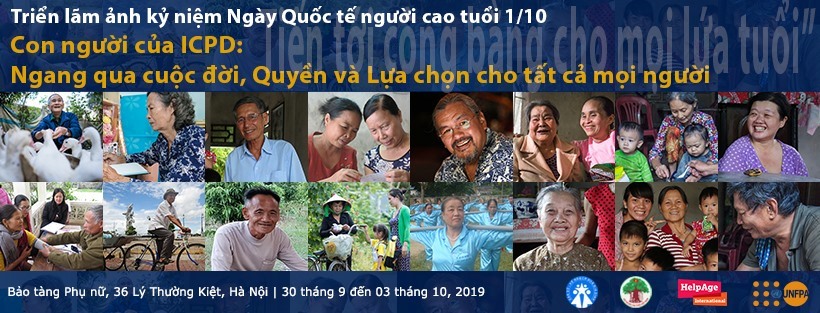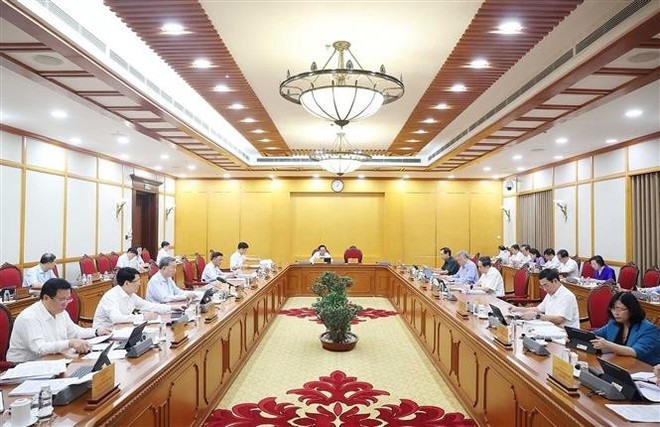Vietnam must be prepared for ageing population: UNFPA
 |
At the event. Photo: HelpAge International in Vietnam
The inter-generational forum “The Journey to Age Equality” was held on September 30 in Hanoi by the United Nations Population Fund (UNFPA), in collaboration with the Vietnam Association of the Elderly (VAE), the General Office for Population and Family Planning (GOPFP), and HelpAge International in Vietnam.
The event was organized to mark the International Day of Older Persons to show a positive view of ageing population in turning challenges into opportunities and to strengthen the understanding of the dynamics of an ageing society.
The theme “The Journey to Age Equality” explores societal and structural changes in view of life course policies: life-long learning, proactive and adaptive labour policies, social protection and universal health coverage.
Population ageing is one of the most significant trends and features of the 21st century. Globally, one in nine persons is aged 60 or older, and this is projected to increase to one in five by 2050. Between 2015 and 2030, it is estimated that the number of older persons worldwide is set to increase by 56 per cent—from 901 million to more than 1.4 billion. By 2030, the number of people aged 60 and above will exceed those aged 15 and 24.
Vietnam has officially entered the "ageing phase" since 2011, and it is among the most rapidly ageing countries in the world. The proportion of older persons in the total population has increased to 11.9 per cent, and one in nine persons is over the age of 60 in 2017.
According to the projection of the General Statistics Office, the population over 60 years old is expected to reach 21 million, accounting for 20 per cent of total population by 2038, and 27 million, accounting for 25 per cent of total population by 2050.
Addressing the forum, Dam Huu Dac, the Vice President of the Vietnam Association of the Elderly stressed that, Vietnam is one of the countries with the fastest population ageing in Asia. The transition period from the "population ageing" period to the "aged population" is about 17-20 years. This creates many difficulties in developing policies and programmes for the elderly. Many older persons are still facing difficulties and challenges in their lives, and need more attention, care and support from the government and communities.
Participating in the inter-generational forum were three groups of people over sixty, forty and twenty years old, discussing their experiences, lessons learned and progress on the journey to ending older age inequality and changing negative narratives and stereotypes involving “older age”. The three generations had inspirational discussions and confirmed that age is nothing but a number, and both senior and young generations are valuable in their own right, and older persons are active and forward-looking participants in society.
Addressing the event, Naomi Kitahara, UNFPA Representative in Vietnam said, Population ageing is not the subject to be ignored in the 2030 Sustainable Development Agenda. Population ageing happens not because of mortality decline, or because people live longer, but because fertility declines. All countries in the world including Vietnam must be prepared for aging when couples start to have a smaller family. Vietnam must envision a new paradigm that aligns demographic ageing with economic and social growth and ensure social inclusion of the elderly.
 |
As the year of 2019 marks the 25th anniversary of the adoption of the Programme of Action of the International Conference on Population and Development (ICPD), a photo voice exhibition called “Humans of ICPD: Across the life cycle: Right and Choice for All People” opens from September 30 to October 3 at the Vietnamese Women’s Museum.
The exhibition showcases two sets of photos: one set with 15 photos of 15 ICPD Principles that represent the interrelationships between population and sustainable development. And another set of photos with 15 inspiring stories of older persons in different parts of the country.
HelpAge International points out that Ageism, if defined as “… direct or indirect actions where someone is excluded, considered different, restricted, ignored, or treated as if they didn’t exist because of their age” is a main barrier for achieving equality and assuring rights of older persons. Ageism should not be associated with being disrespected, being treated unfairly, having untrue assumptions or feeling invisible because of age.
Through the voices of older persons, a message must be spread, and movement needs to be created that older persons are an active participant in the society, and not a burden to the society.
It is extremely important that Vietnam should facilitate employment opportunities, flexible and equal retirement age between men and women, skills development, universal health care and social protection, and age friendly environment for older persons as a means to ensure well-beings for old age.
Removing barriers to age equality, especially eliminating ageism to ensure social inclusion of older persons is the most effective way in responding to population ageing and achieving the Sustainable Development Goals./.
Recommended
 National
National
Vietnam News Today (Jun. 7): Prime Minister works with Estonian firms to accelerate projects in Vietnam
 National
National
Vietnam News Today (Jun. 6): Foreign Investment in Vietnam Surges in Five Months
 National
National
Vietnam News Today (Jun. 5): PM sets off for attendance at UNOC 3 in France, official visits to Estonia, Sweden
 National
National
Vietnam News Today (Jun. 4): Vietnam - Promising Candidate for Southeast Asia’s Next Powerhouse
 National
National
Shangri-La Dialogue 22: Vietnam Highlights Some Issues of Ensuring Stability in a Competitive World
 National
National
Vietnam News Today (Jun. 3): PM Pham Minh Chinh to Attend UN Ocean Conference, Visit Estonia, Sweden
 National
National
Vietnam News Today (Jun. 2): Vietnamese Trade Mission Sounds Out Business Opportunities in United States
 National
National
